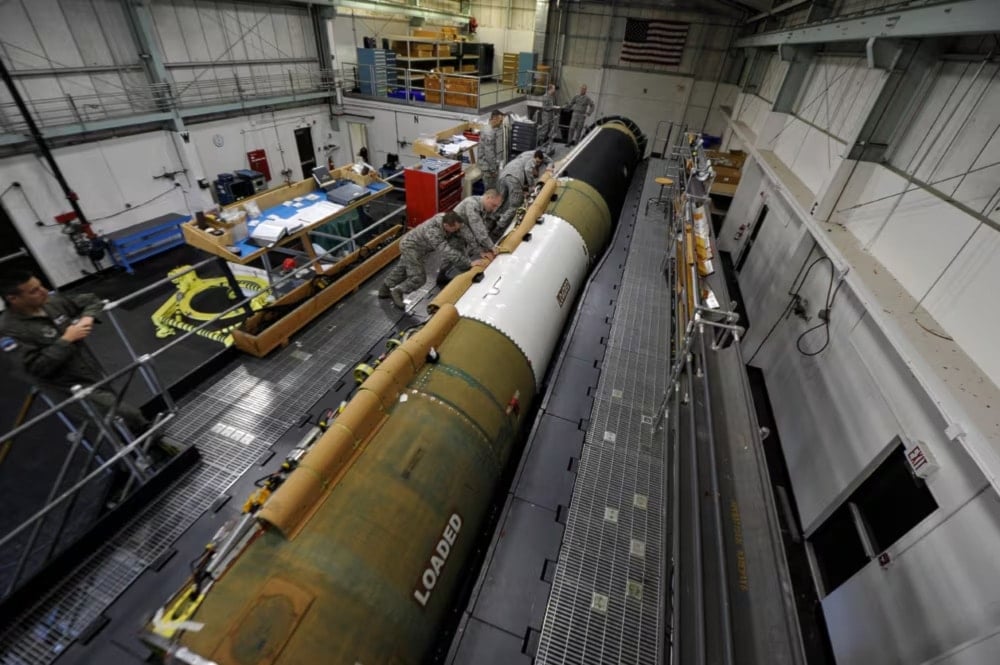Trump nuclear test threat risks escalating tensions with China: NYT
Trump’s call for renewed nuclear testing has raised alarms over US nuclear policy and risks escalating tensions with China and undermining nonproliferation efforts.
-

An undated photo of US Air Force personnel from the 576th Flight Test Squadron Missile Handling Team installing a cable raceway on an intercontinental ballistic missile at Vandenberg Air Force Base, California (Staff Sgt Jonathan Snyder/US Air Force)
US President Donald Trump’s recent remarks suggesting a resumption of nuclear weapons testing have reignited tensions between Washington and Beijing, the New York Times' China correspondent Chris Buckley writes, as concerns mount over a deepening nuclear arms rivalry.
Speaking shortly before a scheduled engagement with Chinese President Xi Jinping, Trump declared, “Because of other countries’ testing programs, I have instructed the Department of War to start testing our nuclear weapons on an equal basis.”
Although he later stated that the comment was not specifically aimed at China, Buckley writes that experts warn the rhetoric could have significant implications for US nuclear policy and global nonproliferation efforts.
Read more: Trump and Xi hold successful talks in Busan, push to end trade war
China responds amid growing US nuclear pressure
Trump’s statement came days after Russian President Vladimir Putin claimed that Moscow had successfully tested a nuclear-capable cruise missile, although without an actual detonation. While Trump’s intent may have been limited to testing delivery systems, the New York Times' writer says analysts believe his words could be interpreted as signaling a broader shift.
“If the United States resumes nuclear testing, it would effectively give China and Russia a carte blanche to do the same,” Ankit Panda, a senior fellow at the Carnegie Endowment for International Peace, told the New York Times. “The nuclear nonproliferation regime is under tremendous stress at the moment.”
NYT writes that Beijing has grown increasingly wary of Washington’s nuclear posture, stating that under Xi Jinping’s leadership, China has expanded its nuclear arsenal, which now includes around 600 warheads, most designed for land-based missiles, still far fewer than the US or Russia, but growing rapidly.
Read more: China accuses US of cyberattacks on national time center
Xi Jinping emphasizes strategic deterrence capabilities
China’s recent five-year development plan prioritizes strengthening “strategic deterrence capabilities,” the New York Times writer states, a term that encompasses Beijing's nuclear forces.
Highlighting China's military parade last month, Buckley states that Beijing showcased China’s growing “nuclear triad," the ability to launch nuclear strikes by land, sea, and air.
“China’s pace of nuclear expansion will continue and won’t change just because of Trump’s announcement,” Lin Po-chou, a researcher at Taiwan’s Institute for National Defense and Security Research, told the New York Times.
Elbridge Colby, undersecretary of defense under Trump, noted to senators earlier this year that “Russia has nearly completed their modernization of all of their nuclear forces, and China is modernizing, and they are growing their arsenal at a breathtaking speed.”
Lop Nur test site shows renewed activity
Satellite imagery has revealed ongoing construction at Lop Nur, China’s historic nuclear test site in Xinjiang. Buckley cites analysts Renny Babiarz and Jason Wang, who have noted new tunnel construction that may indicate preparations for potential underground testing.
China’s last nuclear test occurred in 1996, shortly before the adoption of the Comprehensive Nuclear-Test-Ban Treaty. Like the US, China signed but did not ratify the treaty. Since then, Buckley writes, both countries have conducted sub-critical tests that avoid full detonations.
The New York Times' China correspondent states that if Trump were to officially order new nuclear tests, experts estimate it would take the US approximately 18 months to prepare its testing site in Nevada, whereas China and Russia could likely act more swiftly.
Nonproliferation regime under strain
Buckley writes that the international nuclear nonproliferation framework faces mounting pressure as the three largest nuclear powers, the US, China, and Russia, struggle to find common ground.
He warns that Trump’s remarks, even if not yet translated into policy, risk undermining long-standing norms and could embolden other nations to pursue or resume nuclear testing.
As geopolitical rivalry deepens, the risk of renewed nuclear escalation, both rhetorical and strategic, is now firmly back on the global agenda, according to Buckley.
Read more: Iran Leader derides Trump over claim of destroying nuclear industry

 4 Min Read
4 Min Read










